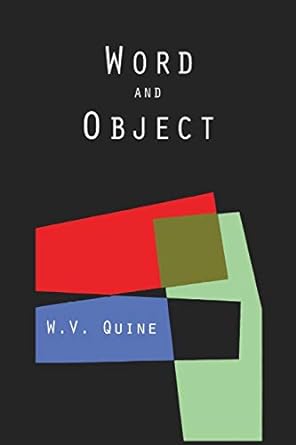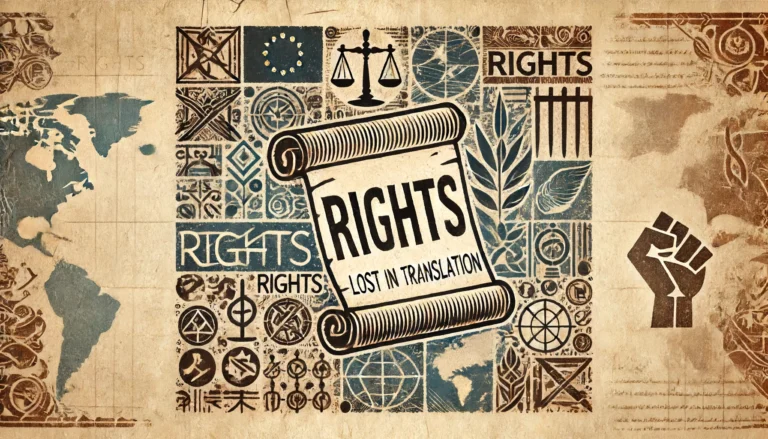In his book Word and object, WV Quine describes the problems that arise when attempting to translate a completely unknown language. Among the ideas he raises in his discussion is that when trying to translate what someone is saying, one should use principle of charity, by which Quine meant that we should assume that “statements that are astonishingly false at first glance are likely to backfire on hidden differences between languages.” If your translation implies that your interlocutor said something patently absurd, you should assume that something was lost in translation rather than assuming that you are speaking with an imbecile. And Quine points out that this is not limited to translation from unknown languages: the same problem can arise “in the national case” due to “linguistic divergences”.

I try, however imperfectly, to apply this idea when talking to other people. And recently I’ve been wondering whether such “linguistic divergence” might, if properly addressed, help me have a more charitable understanding of how some people talk about rights.
The point of view in question was describe by Michael Huemer as Legalist point of view of rights. (It should be noted that in this article Huemer speaks specifically of property rightsbut the same view is often taken about rights more generally.) As Huemer says, in the legalist view,
Property rights depend in all aspects and details on laws created by the government. (NB: Property rights are not only legal rights but also moral rights; this is why theft is not only illegal but unethical. The legalist view is not simply saying that some legal rights depend on laws, but relevant moral rights depend on laws.)
It’s a line of thinking I’ve heard in various forms over the years. Its proponents will often say, “Rights only exist to the extent that they are established by a society and/or enforced by the state.” Talking about “right” about something that has no social force behind it is confusing. If it is not supported and enforced by a state or by society, then it is not a right. »
Now, this line of thinking has always seemed to me, in Quine’s words, surprisingly false at first glance, because it has rather absurd implications. For example, I take it for granted that slavery represented the greatest institutionalization of human rights violations in history. But from a “rights only exist when enforced by a state” perspective, slavery was not a rights violation at all. If rights only exist if a state (or sufficiently strong social conventions) recognizes and enforces them, it simply follows that whenever slavery is imposed by the state and considered generally acceptable by citizens , no enslaved person experiences any violation of their rights – because in reality, they don’t have any. From this perspective, the infamous Dredd Scott decision declaring that African Americans “had no rights which the white man was bound to respect” was not a grave error – it was an unambiguous factual statement (at least at the time). If your theory says that slavery doesn’t violate anyone’s rights as long as society approves of it and the state enforces it, you need a better theory.
At least that’s what it always seemed to me. But I’m now wondering if perhaps there isn’t a hidden difference between the languages, or a linguistic divergence, that might shed a different light on things. I was recently reminded of a back and forth in the comments section of this blog about the nature of rights from a few years ago (yes, I remember things like this, but I don’t don’t usually remember my siblings’ birthdays!). A commentator defended a legalistic view of rights, stating that if one believes that “rights exist and can be ‘denied’ even when the social context clearly does not recognize these rights, then I would not agree with this part of the argument. There are many rights that societies should create and protect; but they don’t exist until society does this.
But I realized that, based on something else, the commenter had said that his point of view might be salvageable. This message also discussed Love against Virginia case that overturned the ban on interracial marriage. According to the legalist point of view defended by this speaker, it should be said that such laws, before being repealed, did not violate anyone’s rights. And this commenter agreed with that implication — although he also added his belief that “the Lovings *should have* had the right to marry.” However, before the court decisions were issued, they did not have this right.
So here is my suggestion that might bridge the gap. This commenter claimed that he believed that the Lovings should have had the right to marry. This implies that the state was wrong to prevent them from marrying. Well, saying “it’s not right for the state to stop people from doing X” is, for people like me, simply what it means. means say that people have the right to It’s a prescriptive assertion, which in turn allows us to assess what types of laws are appropriate or inappropriate. From this point of view, laws and conventions can constitute violations of rights. According to this alternative definition of rights, saying “people have the right to freedom of expression” is a description statement, and as such it can be true or false depending on the laws and conventions of a given society. So, on this view, laws and conventions cannot violate rights, because “rights” simply means “whatever is recognized and enforced by laws and conventions.”
Then consider what this speaker also said: “There are many rights that I think corporations should create and protect; but they don’t exist until society does this. This confirms the view that there is something there, existing before and independently of the social application, and this particular something must be protected and recognized. To the extent that society or the State should protects these things but fails to do so is a failure that needs to be corrected. For people like me, it’s this prior thing that we’re talking about when we talk about rights, and what we mean when we say that rights exist before and independently of being formally recognized and enforced by the state or social conventions. This commenter and I both agree that there is something existing before state policy and social conventions which prescribes what these policies and conventions should be. It’s just that I call it an existing prior something “rights”, but this is not the case.
As an additional example, here is another thought experiment proposed by Huemer in the previously cited article, in which I add an additional caveat:
Suppose you are exploring a remote wilderness outside the jurisdiction of any government, when you come across a clearing containing a rudimentary cabin. The hut appears to have been built by a hermit, who is the only inhabitant. Since property rights depend entirely on government laws (or social conventions – KC) and none are in effect here, you determine that the hermit does not own the cabin. Despite his vehement protests, you decide to spend the night in the cabin, eat some of the food the hermit has grown and gathered, and then paint the cabin lime green. You don’t need to do any of these things; you just do them for fun.
In this thought experiment, the hermit is not under the jurisdiction of any government and there is no reigning social convention. Yet it seems obvious that you would do something bad to the hermit if you performed these acts. And I think almost everyone who accepts the legalistic view of rights, if pressed, would recognize that it would be a mistake to do these things in a hermit’s way. Well, the wrongness of these actions is, for people like me, simply what it means. means say that the hermit has property rights here and that you have violated them. If you agree that it would be wrong to do these things to the hermit, then you agree with the substance of what people like me mean when we say that the hermit has rights even in the absence of state and social enforcement, even if you wanted to. describe the situation with different vocabulary.
My goal in this article is not to claim that any definition of “rights” is objectively correct, or that one is pragmatically superior to the other. (I may return to this point in a future article, but let’s leave it aside for now.) My point is simply that it’s possible that much of the disagreement over The question of whether rights exist before or independently of the state rests simply on a linguistic dimension. disagreement over what the word “rights” is supposed to mean.


